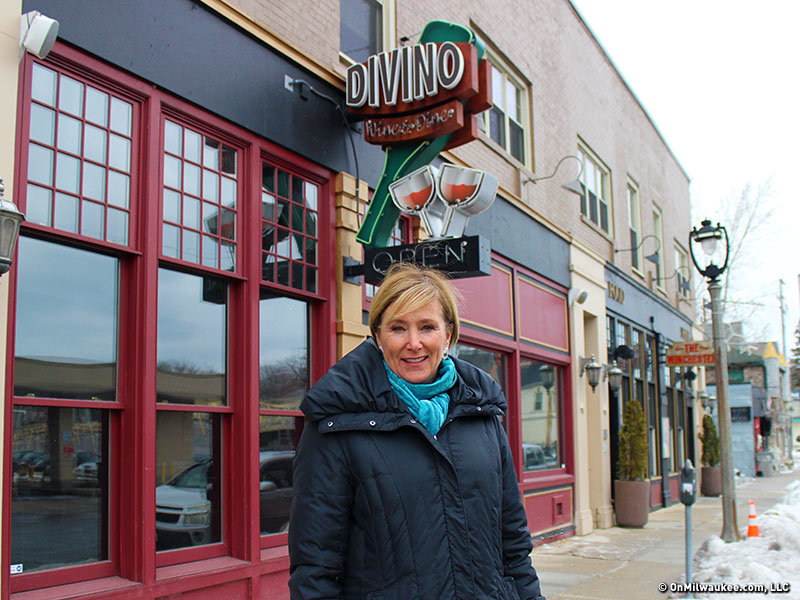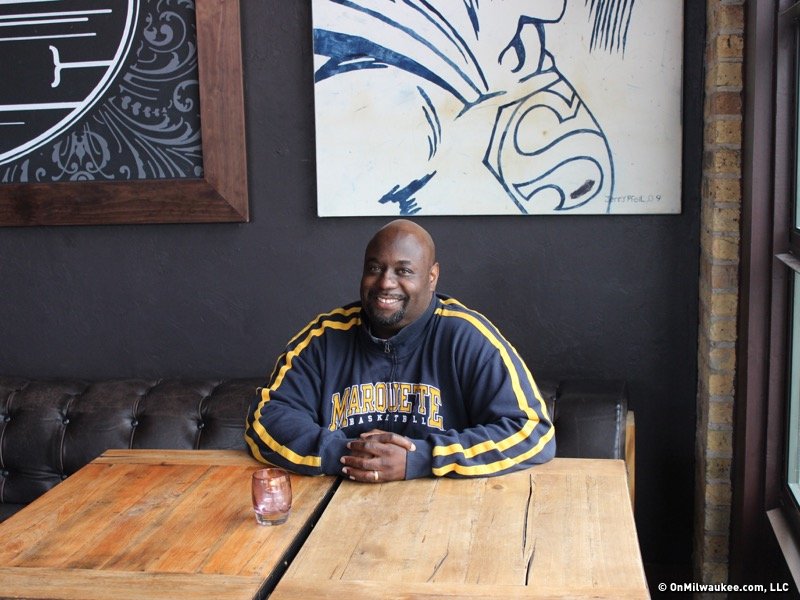Milwaukee is filled with amazing people. And some of those people are wild about food. 8 Questions is a series that focuses on food lovers in our midst. They aren’t chefs. They don’t work in the food industry. But they know a thing or two about eating. And that’s part of what makes them awesome.
Two such people are Christine Radiske and Herb Quigley, food lovers who have been eating their way through Milwaukee together since 1998.
Radiske was born and raised in Milwaukee. She earned her degree in food and nutrition at UW-Stout, and moved on to work for the National Canners Association before leaving the food industry and taking a job handling communications and lobbying for trade associations.
Quigley, who grew up in New Jersey, spent 10 years in the Marine Corps before moving to Portland, where he earned his degree in finance and landed a job with Tectronics making test measurement and computer design equipment.
The two first met in Washington D.C. when Quigley hired Radiske to manage communications for the National Computer Graphics Association he was organizing. But it wasn’t until a decade later, when Quigley got divorced from his first wife, that the two got back in touch.
"We both traveled for work," notes Quigley. "And we traveled so much that we decided to start a business together so that we’d see one another more regularly."
The two landed in Ireland, where they purchased a 300-year-old farmhouse that they turned into a guesthouse and restaurant called Ballycormac House, which they managed until moving back to Milwaukee in 1998 when Radiske's father became ill.
As of this June, Radiske and Quigley have been married for 26 years. When they’re not eating in area restaurants, they keep busy attending the symphony, ballet and Danceworks performances. They also have season tickets with four theater companies and are self-proclaimed movie buffs who enjoy the Milwaukee Film Festival. They live on the East Side with their Shih Poo, Morticia.
We sat down with Radiske and Quigley at c.1880, one of their favorite places to dine, to find out more about their love of food.
OnMilwaukee: Tell us a bit more about the property in Ireland.
Christine Radiske: We did a set menu every night. We grew our produce in a garden on the property, and we had an herb garden with about 40 herbs growing in it.
Herb Quigley: We had two big 10-foot rows of raspberries. And I was so sick of picking raspberries that I couldn’t eat them anymore. And gooseberries! Black currants and all of these wonderful things.
Radiske: When we moved to Ireland, there was no food scene to speak of. And then we moved back to Milwaukee and the same thing happened. Today in Milwaukee, it’s almost an embarrassment of riches.
What originally inspired your love of food?
Radiske: My mother and grandmother cooked, and I can’t remember a time when I wasn’t being called into the kitchen. My mother always said I should be a teacher or dietician. I liked the idea of working with food, so that’s what I pursued.
Quigley: My mother was a terrible cook, so I learned how to cook when I was fairly young, just so I could eat better. But the good side of New Jersey was that we were in the southern part, and we got the best of the produce in the summer. There was a lot of good Italian food around me. And I loved that, and still do.
Later on, I traveled a lot. I was stationed in Japan and was really exposed to cuisines from all over the world. I still have a great memory of the first artichoke I ate in France. I was on a cruise in the marine corps. I found a restaurant and went in. There was nothing on the menu in English, but a gentleman was sitting there and he had a half of a bottle of wine and they brought him an artichoke. So I pointed at it, and they brought me one. I started by digging into the bottom, and the waiter actually came back over to the table and showed me how to avoid the choke.
Do you cook? If so, what are some of your favorite things to make?
Radiske: I cook for two weeks, and he cooks for two weeks. So we menu plan and shop, and one of us is responsible for everything. We eat lots of fish, lots of vegetables. At our age, we’re cutting back on carbs. We eat simply really.
Quigley: When we eat meat, we get locally sourced beef and lamb from Bavette. She also does great pork.
Radiske: And I love making desserts. A friend of ours was a pastry chef, and I have a great recipe for pastry crust. And in the summer, all you have to do is give me lots of fruit, and I’ll make fruit tarts. Last night, we ate halibut with orange sauce. And we found rhubarb at the West Allis Farmers’ Market, so we’ll be making that into a crisp.
Do you share a favorite type of cuisine?
Quigley: We make a lot of Indian food, Italian, Sicilian. Right now, we’ve been working our way through the "Jerusalem" cookbook, and there’s just fabulous recipes in there. And a few years ago, we bought the "Share" cookbook, which contains recipes from villages all over the world, including Africa and Asia. And all the proceeds go to the cause.
And we love spicy food. We’ll put anything hot in our mouths … and anything that’s weird. In the "Jerusalem" cookbook, they use a lot of sumac. In Wisconsin, if you made things from sumac, you’d poison yourself. So thank goodness for Spice House.
Radiske: Oh, yes, we love to experiment. There is a book called "50 Best Curries" that we’ve worked our way through. Some are so hot you can barely eat them. But so many of them are delicious and complex.
You both are fairly well-traveled. Do you have a favorite food city?
Quigley: We’re going to spend almost the entire month of September in Paris for Christine’s birthday.
Radiske: We love it there. We’ve planned out all the concerts and museums and things that are hard to get into. As for food, there’s a restaurant called Les Climats that specializes in Burgundy.
Quigley: They boast 8,000 bottles of wine in their cellars. And the restaurant has caves for wine storage.
Radiske: But everywhere you go in Paris is delightful. All the little neighborhood places.
Quigley: And we will also sometimes pick up a rotisserie chicken from one of the great shops and then go to a boulangerie for a baguette. And buy some remoulade. Or go into a patisserie and get dessert.
We’re running out of time to do everything we’d like to do. The Picasso Museum has just reopened, and so we’ll have a docent take us through that. The Rodin museum has just been done. Even just sitting in the parks is wonderful.
Radiske: It’s one of the only places I’ve been where you can’t walk on the grass. But that means it’s beautiful.
What are your favorite places to dine in Milwaukee?
Radiske: We’re sitting in one. God, it’s good. We love the fish and seafood. No matter what he does, it’s wonderful. And the other thing I love is spaetzel. I grew up hating spaetzel. So the first time we got it with a dish, I figured I’d eat around it. But I ended up eating more of the spaetzel than the meat.
Quigley: When we first started coming, he always had pheasant on the menu. And Christine had it every time we ate here, probably six times in a row. But it was different every time.
Radiske: We also love the cheese course here. And we like that more places around town are offering a cheese course.
Quigley: It’s also difficult for us to talk about favorite restaurants. For us, it’s maybe more accurate to talk about where we go to get our favorite foods. We love Sanford for what they do.
Radiske: And we love MOVIDA. One thing that’s lacking here is places to eat late. We always go to dinner after the theater. And we fell in love with MOVIDA because the kitchen is open until 11.
Quigley: And we love Wolf Peach. And Coquette. And Buckley’s needs to be on the list.
Radiske: This is our eighteenth year of going to Coquette Cafe, and David has been our waiter all that time. We’ve grown up together. Amilinda is great. We love what they’re doing.
Quigley: Yes, and they served blood sausage, which I love.
Do you have any favorite secret food spots?
Quigley: Lazy Susan does a dinner for two on Tuesday nights, and it’s four courses. She publishes the menu in the late afternoon on the day. It’s $40 and half-off wine. You get two starters and an entree. And then a dessert. And we’ve had the most spectacular fish in the world there. It’s just such a nifty idea. And it’s such good food.
Could you tell us about your latest (or greatest) food adventure?
Radiske: We were in China for six weeks, and it was mind-blowing. And since then, we have only cooked Chinese for ourselves because there is no real Chinese food here.
Quigley: We took a cooking class while we were there, and it was amazing for us. And we learned how to clean our wok. And how to put water into the wok to make it nonstick.
We also ate some really delicious food. In Szechuan, there was a dish – I think it’s called Mai Po Do Po – and it was little pieces of chicken that are cooked in a pot of red peppers. And you sort through and pull out the chicken. And it was just fantastic.
Radiske: And I never met a dumpling I didn’t like.
Quigley: And then there was the fresh food. We went to Emei Mountain. It’s littered with Buddhist temples and has the only convent in the country. It’s fairly warm, and there’s an outdoor area where there are places to eat. We walked up to one of the booths, and there was a farmer there who was squatted alongside the stall killing chickens. And we thought we’re not going to get any fresher than that.
Lori is an avid cook whose accrual of condiments and spices is rivaled only by her cookbook collection. Her passion for the culinary industry was birthed while balancing A&W root beer mugs as a teenage carhop, fed by insatiable curiosity and fueled by the people whose stories entwine with each and every dish. She’s had the privilege of chronicling these tales via numerous media, including OnMilwaukee and in her book “Milwaukee Food.” Her work has garnered journalism awards from entities including the Milwaukee Press Club.
When she’s not eating, photographing food, writing or recording the FoodCrush podcast, you’ll find Lori seeking out adventures with her husband Paul, traveling, cooking, reading, learning, snuggling with her cats and looking for ways to make a difference.






